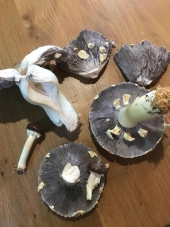We have a problem with rats in and near our chicken run. During the day I often see a few rats jumping in the bushes when I move to the coop, and in the evening when the chickens are inside their coop, the run is practically filled with rats! And these guys aren’t even scared of me, they’ll just be happily minding their business looking for food while I’m just a couple of feet away!
Aside from the rats near the chickens, we also have mice near our home (and whenever they find a new hole — in our home), and some type of squirrel-rats that are chewing up the insulation under our roof!! I love living in the countryside. But I’m pregnant, tired and overwhelmed, and this is just one worry to many to deal with! What do I do?
But let’s start by focusing on the rats - as these guys are seem to be the most urgent issue.
Our chickens are kept within a mobile coop with electric netting that is moved every month or so. We feed them grain that we scatter on the ground. We tried the automatic feeders with a pedal system that keep mice and rats away, but our chickens have a habit of throwing the feed out of the feeder to then eat it from the ground which doesn’t help. We also currently have a few chicks in the flock that don’t weigh enough to be able to activate the pedal to access the feed. So we went back to feeding the grain directly on the ground for now. We also give greens and kitchen scraps to our hens. We don’t give too much grain that a lot of it remains on the ground at night. We feed in the morning, so by the evening almost all of it has been eaten by the hens. Nevertheless looking from the amount of rats I see, there must still be food to find for the pesky nibblers.
Now my question is: how much of a problem are rats really? Are they a health concern for me and my hens? Is there any permie-benefit at all to having this many rats around?
And if not, how should I go about getting rid of them?
I read that getting rid of rats needs a three pronged attack: removing their nest, removing their access to food and killing of whatever rats remain after that.
We live in a very wild and forested area with lots of piles of rocks, woods and leaves, and with a creek running through it, and lots of things for rodents to eat (lots of nut trees, lots of wild grasses that are in seed, berries,…) So really a forest creature’s paradise. So I don’t really see how I can remove their nests or stop them having access to food. Unless I clear our entire woods, and whatever beneficial foods and nesting areas for the other wildlife that we like to keep.
So that leaves the only other option: killing the rats.
I suppose the permie-way to do this would be to attract predators. But aside from owls, which I haven’t seen yet, there are already snakes, foxes, eagles and stray cats in abundance. But clearly it isn’t enough to deal with this amount of rodents ( there is many talk in the village that the rodent population has really exploded these last years).
Also, because the rats get inside our electric netted paddock, cats and foxes can’t easily reach them while they are in there. And because our paddocks are in forested areas with much tree and ground cover, areal attacks from eagles or owls are also less likely to happen while the rats are in the paddock.
So whatever is left for me to do? Poison is ofcourse a big no. And I’m not to keen on having to touch the rats (Being pregnant, I really don’t want to have to touch these possible disease carrying critters on a daily basis), so the traditional traps that snap shut, where I have to touch the rats to get them out of the trap, aren’t going to work either. The live traps that let you release the rats elsewhere don’t seem like a good idea either, given that the village is already complaining of rats everywhere. And I’m not willing nor able to drive half an hour each day to release the rats in another part of the forest.
So what options do I have? Any advice would be very welcome!!








